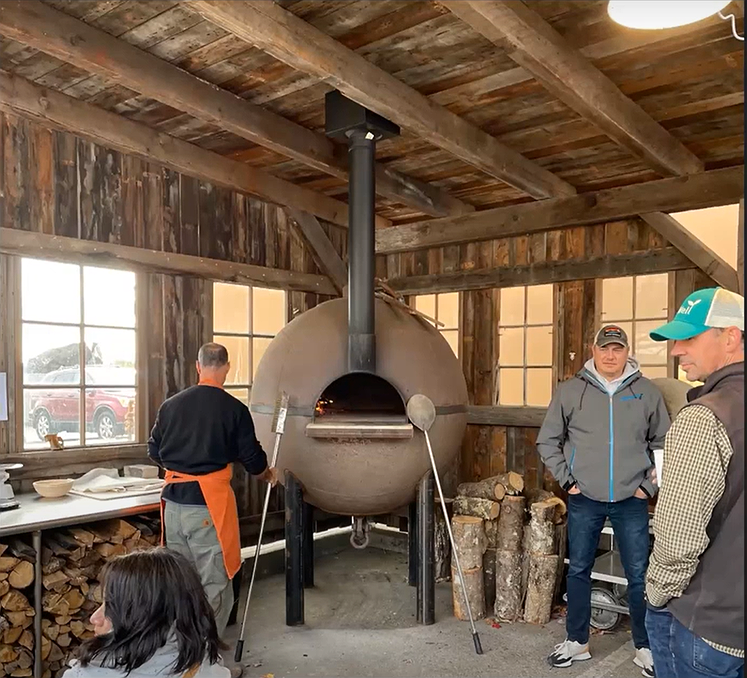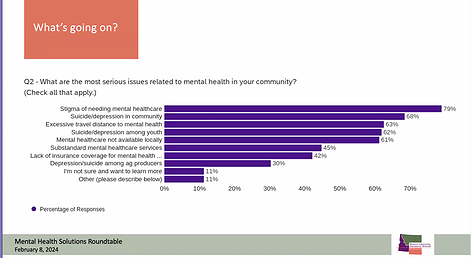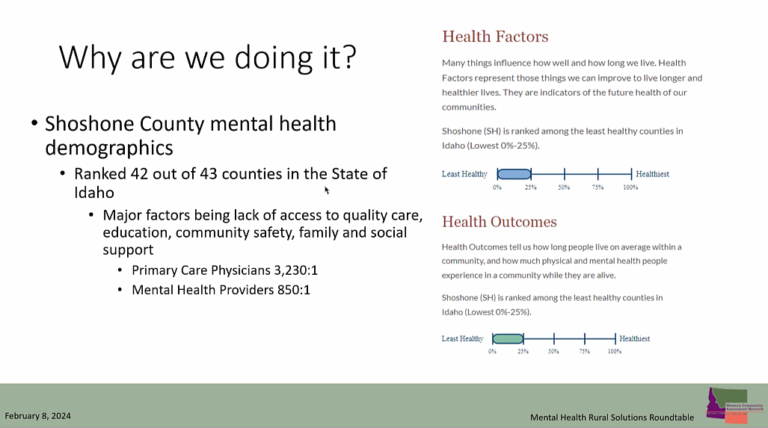Laurie Higgins considers her team at Western Community Assessment Network to be a “small but mighty team” that can positively impact the community. The same goes for many of the participants who have logged in from 35 states to participate in the WeCAN Rural Mental Health Solutions Roundtable.
WeCAN received funding from the U.S. Department of Agriculture six years ago to foster collaboration among rural communities in Idaho, Montana, and Wyoming and focus on issues that negatively impact communities.
As part of the virtual roundtable, Paige Olsen presented materials to community members of all backgrounds about how Silver Valley CARES is addressing mental health issues in Shoshone County.
According to the University of Wisconsin Population Health Research Institute, Shoshone County has a shortage of available counselors at a ratio of 850 community members to 1 mental health provider, so SV CARES is providing mental health training and related education. A session is in progress. It has appeared.
“We wanted to get anyone involved, anything we could work with to help with different ways to relieve stress and help with mental health. We wanted people to sit down with a counselor and get involved. We don’t want people to feel like they have to talk about it. There are other ways to soothe yourself, like art, fitness, church, etc.,” Olsen said during her presentation.
SV Cares’ free community training and outreach sparked interest, both in the initial conversation and in the informal discussions that followed the roundtable.
Olsen said securing funding for community members to operate SV CARES through outside funding is an idea people are excited about as a way to maintain organizers’ commitment.
“I definitely think and hope that people will emulate what we’re doing. I hope people will consider that partnership because it’s an invaluable partnership for success,” Olsen said.
One of the things she is considering bringing back to Shoshone County as a potential future project is buddy benches for schools and communities.
The purpose of the Buddy Bench is to create a channel that fosters nonverbal connections between peers when students or individuals are feeling isolated.
Similarly, David Callister, an extension educator at the University of Idaho, shared some of his experiences dealing with the intergenerational pressures of losing his family farm.
“If someone breaks their arm, no one would hesitate to ask for help,” David Callister said. The same should be true for people experiencing chemical imbalances that harm their mental health, he continued.
Melissa Cook of the University of Wyoming Extension jumped on the link between economics and mental states.
“You can’t talk about economic development without mental health,” Cook said.
One recurring theme was how sharing a meal can cut through isolation and overcome social stigma against bringing up the topic.
A pizza oven made from a World War II anti-submarine buoy provided solace for farmers gathered at the Washington State University Bread Institute in Skagit County in 2022.
Josh Tieken spoke candidly about the possibility of recreating an unlikely project and making it portable in the rural area around Rigby, Idaho, after his parent committed suicide.
Teiken has high hopes for this project, which will save rural residents from isolation.
“By creating something unique, people will want to come smell this pizza baking, make social connections, and help break down the stigma of talking about mental health.” Mr. Taken said. and promote healing in our communities. Our hope is that we can help break down the stigma without shame. ”
For more information
North Idaho Crisis Center — Coeur d’Alene
North Idaho Crisis Center
2195 Ironwood Court, Suite D, Coeur d’Alene — 208-625-4884
Idaho Suicide Prevention Hotline (call or text) — 208-398-4357
National Suicide Prevention Lifeline — 800-273-8255
 In 2022, farmers gathered at Washington State University’s Bread Institute in Skagit County were soothed by a pizza oven made from a World War II anti-submarine buoy. In Rigby, Idaho, community members rallied to recreate this project.
In 2022, farmers gathered at Washington State University’s Bread Institute in Skagit County were soothed by a pizza oven made from a World War II anti-submarine buoy. In Rigby, Idaho, community members rallied to recreate this project. Screenshot of WeCAN Rural Mental Health Solutions survey responses. Community mental health needs are reported to be serious, with 79% of WeCAN roundtable respondents saying stigma against mental care is a major problem, and 68% saying suicidal ideation and depression are a problem. 63% said traveling for mental health care was difficult. It’s a top priority.
Screenshot of WeCAN Rural Mental Health Solutions survey responses. Community mental health needs are reported to be serious, with 79% of WeCAN roundtable respondents saying stigma against mental care is a major problem, and 68% saying suicidal ideation and depression are a problem. 63% said traveling for mental health care was difficult. It’s a top priority.

